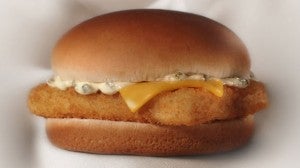Recently, McDonald’s USA announced that it would become the first national restaurant chain to serve fish sporting an eco-label from the Marine Stewardship Council at all of its locations across the country. The new label will make its debut in conjunction with the launch of the restaurant’s new Fish McBites next month, although it’s already selling MSC-certified wild-caught Alaska pollock in its fish filet sandwiches and has been using certified fish in the US since 2005.
According to the Chicago Tribune, McDonald’s audits its fish supply to ensure both sustainability and traceability – the ability to trace the fish all the way through the supply chain from the restaurant back to the fishery. As one of the largest buyers of fish in the United States, McDonald’s decision to promote sustainable fish in its marketing and sales will help raise the visibility of this issue and the ability of consumers to choose sustainably caught fish over those that continue to be overfished.
The Alaskan pollock fishery has one of the strongest catch share management programs in the country, which has resulted in a halt to overfishing. The management program also provides for 100% monitoring, which leads to excellent data collection, allowing fishery managers to track compliance with quotas, record bycatch, assess habitat and ecosystem impacts, and generally improve the conservation and management of marine resources in Alaska.
In addition to being used in McDonald’s products, pollock, the fourth most popular fish in the United States, is the whitefish used in many fish sticks and in imitation crab meat. McDonald’s decision to purchase only sustainably caught fish and to promote this practice on all of its packaging should serve as a model to other businesses and an important step toward supporting fisheries that are adopting programs to restore our oceans to health.










